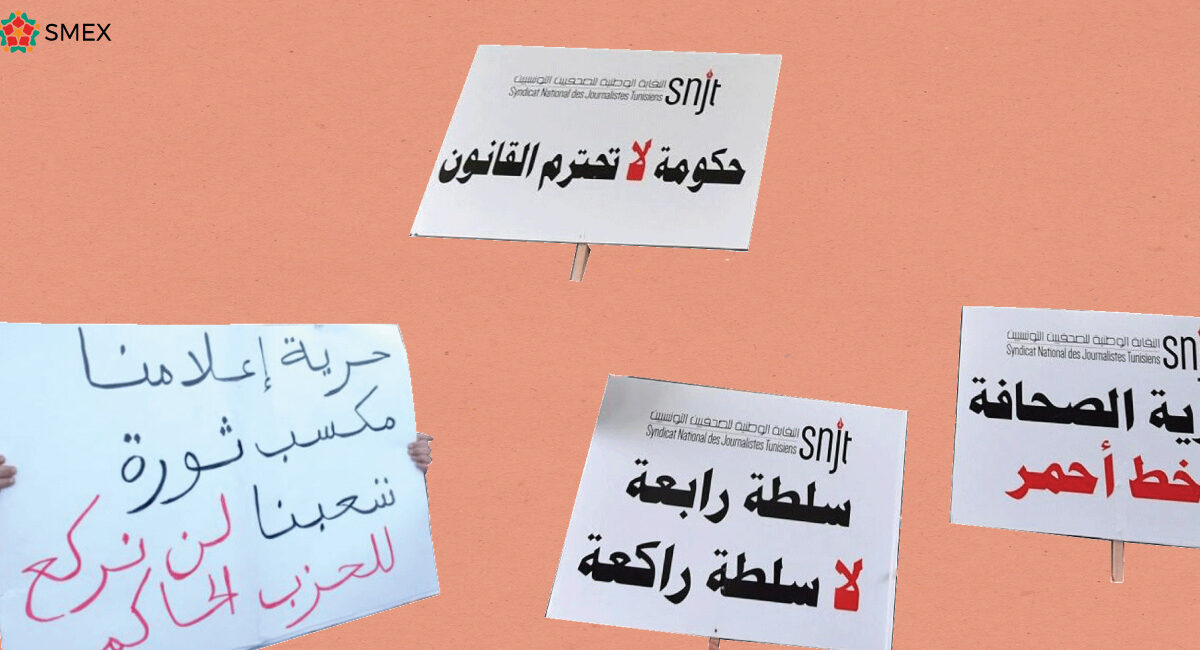After Tunisian journalists gathered to protest government restrictions on freedom of expression, loyalists to the Tunisian President Kais Saied launched a smear campaign on Facebook against Mehdi Jelassi, the head of the National Syndicate of Tunisian Journalists (SNJT).
Those same pages accused Jelassi of having ties with businessman Kamal Latif, who was arrested by the police and charged with conspiring against state security, and described him as a “mercenary.”
On February 16, the National Syndicate of Tunisian Journalists had called for a gathering attended by dozens of journalists in Kasbah Square, near the Prime Minister’s office, holding signs that read “The Media Will Not Bow.” The protesters denounced the government’s restrictions on freedoms and the arrest of Mosaïque FM’s director Noureddine Boutar, who was allegedly interrogated about the radio station’s editorial strategy.
Criticisms directed towards Tunisian President Kais Saied have increased after the government tightened its grip on journalists, especially after Decree 54. The latter is a very controversial piece of legislation used by the Minister of Justice in Najla Bouden’s cabinet to prosecute opponents of Saied for publishing posts on Facebook or making statements to the media. Since then, the systematic incitement and defamation campaigns against critics of the Saied’s policies on social media have intensified.
Journalists between the Hammer of Discretionary Laws and the Anvil of Incitement and Defamation Campaigns
Journalists, unionists, and civil society activists are not concerned about incitement and defamation campaigns. They know they are being launched with the government’s support to counter their opposition to President Kais Saied’s policies.
The head of the National Syndicate of Tunisian Journalists, Mehdi Jelassi, told SMEX: “The Syndicate foresaw all the attacks, insults, defamation, and fake news that have targeted us on social media, knowing fully well that these campaigns often incite people to commit acts of violence and threaten the safety of journalists.”
However, Jelassi added that the authorities did not take any measures to protect journalists and activists defending rights and freedoms: “In fact, the authorities have done the complete opposite; they encourage such acts by granting immunity to those responsible for incitement and defamation campaigns targeting anyone who criticizes the policies of President Saied or his government.”
This is often coupled with a hostile official discourse describing journalists as “mercenaries,” to quote the Minister of Interior. On March 7, a video of the latter was circulated on social media. He said, “Tunisians do not need the media to access information […] journalists are mercenaries and traitors.” The National Syndicate of Tunisian Journalists denounced this remark and described it as an inflammatory discourse that accuses journalists and unions of treason.
About the defamation campaigns against the Syndicate as well as those targeting him personally, Jelassi explained: “The reason for the campaign against me is clear: it is the fact that the National Syndicate of Tunisian Journalists supports the freedom of the press and the freedom of expression and advocates for rights and freedoms. We will never renege on this commitment, as we cannot remain silent despite the abuses and violations committed by the government despite all those campaigns. I believe the judiciary has a historical responsibility to purify the public sphere and suppress defamatory and demeaning voices.”
Khaoula Boukrim, the journalist at Kashf Media, was also the victim of defamation by the official page of an attorney known for defending the policies of President Kais Saied. The campaign against Boukrim was launched after she discussed it with the wife of Bashir Al-Akrami after the investigating judge at the Anti-terrorism Court issued an arrest warrant against him last week. On her official Facebook page, the attorney called for a closer investigation of journalist Khaoula Boukrim, describing her work as”suspicious” and claiming she is “affiliated with Qatar.”
Indiscriminate Campaigns
Ramadan Ben Omar, the official in charge of migration at the Tunisian Forum for Economic and Social Rights (FTDES), was also the victim of defamation on social media for his humanitarian positions against racist campaigns targeting migrants from Sub-Saharan Africa.
Ben Omar was accused of “treason” and of” undermining the state’s image internationally” through comments or posts on Facebook, according to what he told SMEX. “The defamation campaigns spread from Facebook into the real world. Some accused me of treason simply because I supported irregular migrants and my criticism of the state’s policy towards undocumented migration. This is the same accusation thrown by the Tunisian President at his critics, whom he accused of conspiring against Tunisia and undermining the country’s image internationally,” Ben Omar added.
Despite this, Ben Omar did not resort to the judiciary to fight the defamation campaigns, as he “does not see any point in filing a lawsuit, because those launching the systematic campaigns against activists and opponents of the Tunisian President are none, other thanSaied’ss supporters.”
Meanwhile, the Tunisian General Labour Union (UGTT), which is the country’s largest union, stated on March 13, calling upon authorities to issue a decision in the “pending lawsuit” filed by the UGTT against supporters of the government, accusing them of”resorting to distortion of the truth, misinformation, defamation, and insults, as they are the source of all such news and information, including those that violate citizens’ data privacy.”
The UGTT also denounced in its statement the”PublicProsecution’ss inaction in the face of all these violations and its tendency to practice discretion when choosing which investigations to open depending on political affiliations.”
The Secretary-General of the UGTT, Noureddine Taboubi, was also targeted by those campaigns and accused of treason and theft.
Furthermore, pages supporting the Tunisian President launched defamation campaigns against Judge Youssef Bouzakher, the former head of the Supreme Judicial Council dissolved by Saied, accusing him of being close to an influential Tunisian businessman due to his opposition to Saied’s interference in the work of the judiciary.
More than twelve years ago, Facebook became a platform for disseminating false news, insults, and defamation in Tunisia, used by opponents during the major electoral events after the revolution. Since President Saied tightened his grip on power about two years ago, defamation campaigns against his opponents seem to have become a powerful weapon to solidify his decisions and “discipline” his critics.



